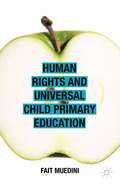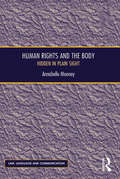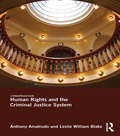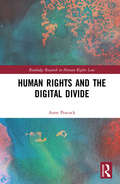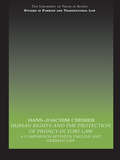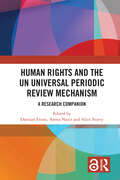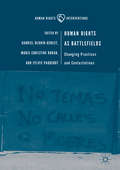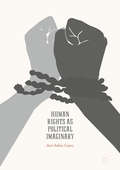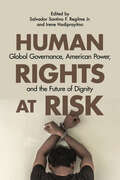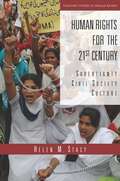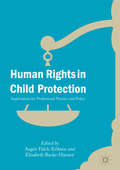- Table View
- List View
Human Rights and Transitional Justice in Chile (Memory Politics and Transitional Justice)
by Hugo Rojas Miriam ShaftoeThis book offers a synthesis of the main achievements and pending challenges during the thirty years of transitional justice in Chile after Augusto Pinochet’s dictatorship. The Chilean experience provides useful comparative perspectives for researchers, students and human rights activists engaged in transitional justice processes around the world. The first chapter explains the theoretical foundations of human rights and transitional justice. The second chapter discusses the main historical milestones in Chile’s recent history which have defined the course of the process of transitional justice. The following chapters provide an overview of the key elements of transitional justice in Chile: truth, reparations, memory, justice, and guarantees of non-repetition.
Human Rights and Universal Child Primary Education
by Fait MuediniThis book examines the progress toward universal child primary education, and the obstacles that remain. Fait Muedini describes the current state of child primary education, the international laws that support the right to free childhood education, and the positive gains that are paving the way to universal free schooling. He also discusses remaining legal and logistical roadblocks still to be overcome by the NGOs and international organizations that strive to deliver free education to allchildren. The benefits to free primary education ripple throughout the world system, and this discussion illuminates the current state of universal education delivery and points the way to next steps.
Human Rights and War Through Civilian Eyes (Pennsylvania Studies in Human Rights)
by Thomas SmithInternational lawyers and ethicists have long judged wars from the perspective of the state and its actions, developing international humanitarian law by asking such questions as "Are the belligerents justified in entering the conflict?" and "How should they conduct themselves during the war's execution?" and "When civilian noncombatants are harmed, who is responsible for their suffering?" <P><P>Human Rights and War Through Civilian Eyes reimagines the ethics of war from the standpoint of its collateral victims, focusing on the effects of war on individuals—on those who are terrorized, or killed, or whose lives are violently disrupted. Upholding a human rights analysis of war, Thomas W. Smith conveys vividly the depth of human loss and the narrowing of everyday life brought about by armed conflict. <P><P>Through riveting case studies of the Iraq War and the recent Gaza conflicts, Smith shows how even combatants who profess to follow the laws of war often engage in appalling violence and brutality, cutting short civilian lives, ruining economies, rending social fabrics, and collapsing public infrastructure. A focus on the human dimension of warfare makes clear the limits of international humanitarian law, and underscores how human rights perspectives increase its efficacy. <P><P> At a moment when liberal states are rethinking the ethics of war as they seek to extricate themselves from unjust or unwise conflicts and taking on the responsibility to intervene to protect vulnerable people from slaughter, Human Rights and War helps us see with bracing clarity the devastating impact of war on innocent people.
Human Rights and the Body: Hidden in Plain Sight (Law, Language and Communication)
by Annabelle MooneyHuman Rights and the Body is a response to the crisis in human rights, to the very real concern that without a secure foundation for the concept of human rights, their very existence is threatened. While there has been consideration of the discourses of human rights and the way in which the body is written upon, research in linguistics has not yet been fully brought to bear on either human rights or the body. Drawing on legal concepts and aspects of the law of human rights, Mooney aims to provide a universally defensible set of human rights and a foundation, or rather a frame, for them. She argues that the proper frames for human rights are firstly the human body, seen as an index reliant on the natural world, secondly the globe and finally, language. These three frames generate rights to food, water, sleep and shelter, environmental protection and a right against dehumanization. This book is essential reading for researchers and graduate students in the fields of human rights and semiotics of law.
Human Rights and the Care of the Self
by Alexandre LefebvreWhen we think of human rights we assume that they are meant to protect people from serious social, legal, and political abuses and to advance global justice. In Human Rights and the Care of the Self Alexandre Lefebvre turns this assumption on its head, showing how the value of human rights also lies in enabling ethical practices of self-transformation. <p><p> Drawing on Foucault's notion of "care of the self," Lefebvre turns to some of the most celebrated authors and activists in the history of human rights–such as Mary Wollstonecraft, Henri Bergson, Eleanor Roosevelt, and Charles Malik–to discover a vision of human rights as a tool for individuals to work on, improve, and transform themselves for their own sake. This new perspective allows us to appreciate a crucial dimension of human rights, one that can help us to care for ourselves in light of pressing social and psychological problems, such as loneliness, fear, hatred, patriarchy, meaninglessness, boredom, and indignity.
Human Rights and the Criminal Justice System
by Anthony Amatrudo Leslie William BlakeWe now live in a world which thinks through the legislative implications of criminal justice with one eye on human rights. Human Rights and the Criminal Justice System provides comprehensive coverage of human rights as it relates to the contemporary criminal justice system. As well as being a significant aspect of international governance and global justice, Amatrudo and Blake argue here that human rights have also eclipsed the rhetoric of religion in contemporary moral discussion. This book explores topics such as terrorism, race, and the rights of prisoners, as well as existing legal structures, court practices, and the developing literature in Criminology, Law and Political Science, in order to critically review the relationship between the developing body of human rights theory and practice, and the criminal justice system. This book will be of considerable interest to those with academic concerns in this area; as well as providing an accessible, yet sophisticated, resource for upper level undergraduate and postgraduate human rights courses.
Human Rights and the Digital Divide (Routledge Research in Human Rights Law)
by Anne PeacockThe Internet’s importance for freedom of expression and other rights comes in part from the ability it bestows on users to create and share information, rather than just receive it. Within the context of existing freedom of expression guarantees, this book critically evaluates the goal of bridging the 'digital divide' – the gap between those who have access to the Internet and those who do not. Central to this analysis is the examination of two questions: first, is there a right to access the Internet, and if so, what does that right look like and how far does it extend? Second, if there is a right to access the Internet, is there a legal obligation on States to overcome the digital divide?Through examination of this debate’s history, analysis of case law in the European Court of Human Rights and Inter-American Court of Human Rights, and a case study of one digital inclusion programme in Jalisco, Mexico, this book concludes that there is indeed currently a legal right to Internet access, but one that it is very limited in scope. The 2012 Joint Declaration on Freedom of Expression and the Internet is aspirational in nature, rather than a representative summary of current protections afforded by the international human rights legal framework. This book establishes a critical foundation from which some of these aspirations could be advanced in the future. The digital divide is not just a human rights challenge nor will it be overcome through human rights law alone. Nevertheless, human rights law could and should do more than it has thus far.
Human Rights and the Environment in Africa: A Research Companion
by Jean-Claude N. Ashukem Semie M. SamaThe relationship between human rights and the environment, as evidenced by the recent UN Resolution on the human right to a healthy environment, is a topical, fascinating, uneasy, and increasingly urgent one. This timely collection explores the inextricable relationship between human rights and the environment as a critical lens for understanding and addressing key human rights and environmental issues confronting Africa. The work explores theoretical, philosophical, doctrinal, and empirical research to interrogate and provide clarity on how and whether the human rights-based approach to environmental protection and policy implications has been effective in enhancing environmental protection and sustainability in Africa. It brings together an elite group of African and international experts to investigate the increasing connectivity and problems with African human rights, environmental governance, and the quest for sustainability. The book is divided into thematic clusters, including: the right of vulnerable communities to sustainability; climate change, the right to development and natural resource governance; corporate environmental responsibility and sustainability; the philosophy of environmental ethics and theories of human rights approaches to environmental governance; procedural environmental rights; the role of the judiciary in environmental protection; and desertification. These themes provide a structure to investigate and clarify specific fundamental questions on Africa’s environmental governance paradigm. This innovative contribution provides an interdisciplinary approach to the philosophical interrelationship and use of human rights approaches to ensure and enhance environmental protection and sustainability. As such, the book will be of interest to African scholars, researchers and students in Human Rights Law, Environmental Studies, Political Science, Ecology and Conservation and Development Studies. It will also be a valuable resource for policymakers, governments, NGOs, practitioners, and all those interested in African environmental governance.
Human Rights and the Ethics of Globalization
by Daniel E. Lee Elizabeth J. LeeHuman Rights and the Ethics of Globalization provides a balanced, thoughtful discussion of the globalization of the economy and the ethical considerations inherent in the many changes it has prompted. The book's introduction maps out the philosophical foundations for constructing an ethic of globalization, taking into account both traditional and contemporary sources. These ideals are applied to four specific test cases: the ethics of investing in China, the case study of the Firestone company's presence in Liberia, free-trade and fair-trade issues pertaining to the coffee trade with Ethiopia, and the use low-wage factories in Mexico to serve the U. S. market. The book concludes with a comprehensive discussion of how to enforce global compliance with basic human rights standards, with particular attention to stopping abuses by multinational corporations through litigation under the Alien Tort Claims Act.
Human Rights and the Private Sphere vol 1: A Comparative Study (UT Austin Studies in Foreign and Transnational Law)
by Jörg Fedtke Dawn OliverParticularly valuable for both academics and practitioners, Human Rights and the Private Sphere: A Comparative Study analyzes the interaction between constitutional rights, freedoms and private law. Focusing primarily on civil and political rights, an international team of constitutional and private law experts have contributed a collection of chapters, each based around a different jurisdiction. They include Denmark, France, Germany, India, Ireland, Israel, Italy, New Zealand, the UK, the US, the European Convention for the Protection of Human Rights and Fundamental Freedoms and the European Union. As well as exploring, chapter by chapter, the key topics and debates in each jurisdiction, a comparative analysis draws the sections together; setting-out the common features and differences in the jurisdictions under review and identifies some common trends in this important area of the law. Cross-references between the various chapters and an appendix containing relevant legislative material and translated quotations from important court decisions makes this volume a valuable tool for those studying and working in the field of international human rights law.
Human Rights and the Protection of Privacy in Tort Law: A Comparison between English and German Law (UT Austin Studies in Foreign and Transnational Law)
by Hans-Joachim CremerIn its case law, the European Court of Human Rights has acknowledged that national courts are bound to give effect to Article 8 of the European Convention of Human Rights (ECHR) which sets out the right to private and family life, when they rule on controversies between private individuals. Article 8 of the ECHR has thus been accorded mittelbare Drittwirkung or indirect ‘third-party’ effect in private law relationships. The German law of privacy, centring on the "allgemeines Persönlichkeitsrecht", has quite a long history, and the influence of the European Court of Human Rights’ interpretation of the ECHR has led to a strengthening of privacy protection in the German law. This book considers how English courts could possibly use and adapt structures adopted by the German legal order in response to rulings from the European Court of Human Rights, to strengthen the protection of privacy in the private sphere.
Human Rights and the UN Universal Periodic Review Mechanism: A Research Companion
by Alice Storey Damian Etone Amna NazirThe Universal Periodic Review (UPR) is a peer-review mechanism, reviewing all 193 UN Member States’ protection and promotion of human rights. After 10 years of the existence of the UPR mechanisms, this collection examines the effectiveness of the UPR, theoretical and conceptual debates about its modus operandi, and the lessons that can be drawn across different regions/states to identify possible improvements. The book argues that despite its limitations, the UPR mechanism with its inclusive, cooperative and collaborative framework, is an important human rights mechanism with the potential to evolve over time into an effective cooperative tool for monitoring human rights implementation. Divided into three parts, the first focuses on exploring a variety of theoretical approaches to understanding the UPR mechanism. The second part examines specific human rights themes and the relationship between the UPR mechanism and other international mechanisms. Finally, Part III questions implementation and the ways in which states/regional groupings have engaged with the UPR mechanism and what lessons can be learned for the future. The volume will be a valuable resource for researchers, academics and policy-makers working in the area of International Human Rights law, International Organizations and International Relations.
Human Rights and the UN Universal Periodic Review Mechanism: A Research Companion
by Alice Storey Damian Etone Amna NazirThe Universal Periodic Review (UPR) is a peer-review mechanism, reviewing all 193 UN Member States’ protection and promotion of human rights. After ten years of the existence of the UPR mechanism, this collection examines the effectiveness of the UPR, theoretical and conceptual debates about its modus operandi, and the lessons that can be drawn across different regions/states to identify possible improvements.The book argues that despite its limitations, the UPR mechanism with its inclusive, cooperative, and collaborative framework, is an important human rights mechanism with the potential to evolve over time into an effective cooperative tool for monitoring human rights implementation. Divided into three parts, the first part focuses on exploring a variety of theoretical approaches to understanding the UPR mechanism. The second part examines specific human rights themes and the relationship between the UPR mechanism and other international mechanisms. Finally, the third part questions implementation and the ways in which states/regional groupings have engaged with the UPR mechanism and what lessons can be learned for the future.The volume will be a valuable resource for researchers, academics, and policymakers working in the area of international human rights law, international organizations, and international relations. We would like to acknowledge the UPR Academic Network (UPRAN) for bringing together the experts on this project and the University of Stirling for providing funds to facilitate open access dissemination for parts of this output.
Human Rights as Battlefields: Changing Practices and Contestations (Human Rights Interventions)
by Gabriel Blouin-Genest Marie-Christine Doran Sylvie PaquerotThis book examines human rights as political battlefields, spaces that are undergoing constant changes in which political conflicts are expressed by a translation process within networks of interactions. This translation, in turn, contributes to modifying the scope and understanding of human rights. Ultimately, these battlefields express the legitimacy encounter of different versions of human rights in contemporary political practices. The volume thus challenges both the tendency to minimize the changing nature of human rights as well as the struggles emerging from the use of human rights discourses as a legitimization tool. By shifting the focus on what stakeholders do instead of solely on the origin, nature or foundations of human rights, the authors reveal that human rights are not static objects: they are constantly transformed and, as such, affect the horizon of universal rights.
Human Rights as Human Independence: A Philosophical and Legal Interpretation (Pennsylvania Studies in Human Rights)
by Julio MonteroCan human rights be claimed against agents other than states, such as transnational corporations and global governance institutions? Does the authority of human rights depend on international law-making, or do they have a moral status that must be honored even in the absence of legal structures? What obligations do human rights impose on states acting across borders? What does it mean that the international community must work together to bring about their universal realization? Do we have human rights to abortion, same-sex marriage, and fully democratic government? What must individuals do for the human rights of others?Although these questions may be essential for the future of global politics and international relations, human rights doctrine offers no conclusive answers for them. In Human Rights as Human Independence, Julio Montero develops an original theory of human rights that helps us think about these and similar issues. Montero argues that human rights regulate the conduct of sovereign political agents both within and beyond borders, and that the aim of human rights norms is to protect everyone's fundamental moral claim to enjoy an equal sphere of agency to develop their personality.Human Rights as Human Independence offers a comprehensive, systematic, and complete account of the nature, sources, and scope of human rights that can be used to interpret international documents and make informed decisions about how human rights practice must be continued in the years to come. The book is thus of interest for a wide audience, ranging from philosophers and political theorists to lawyers, human rights scholars, and activists.
Human Rights as Political Imaginary
by José Julián LópezIn this book, López proposes the ‘political imaginary’ model as a tool to better understand what human rights are in practice, and what they might, or might not, be able to achieve. Human rights are conceptualised as assemblages of relatively stable, but not unchanging, historically situated, and socially embedded practices. Drawing on an emerging iconoclastic historiography of human rights, the author provides a sympathetic yet critical overview of the field of the sociology of human rights. The book addresses debates regarding sociology’s relationships to human rights, the strengths and limits of the notion of practice, human rights’ affinity to postnational citizenship and cosmopolitism, and human rights’ curious, yet fateful, entanglement with the law. Human Rights as Political Imaginary will be of interest to students and scholars across a range of disciplines, including sociology, politics, international relations and criminology.
Human Rights at Risk: Global Governance, American Power, and the Future of Dignity
by Jeffrey Davis Emilie M. Hafner-Burton Alice Storey Salvador Santino Regilme Dahlia Simangan Eduard Jordaan Mark Eccleston-Turner Oumar Ba Irene Hadiprayitno Dinna Prapto Raharja Ka Lok Yip Hans-Martien ten NapelHuman Rights at Risk brings together social scientists, legal scholars, and humanities scholars to analyze the policy challenges of human rights protection in the twenty-first century. The volume is organized based on three overarching themes that highlight the challenges and risks in international human rights: international institutions and global governance of human rights; thematic blind spots in human rights protection; and the human rights challenges of the United States as a global and domestic actor amidst the contemporary global shifts to authoritarianism and illiberal populism. One of the very few books that offer new perspectives that envision the future of transnational human rights norms and human dignity from a multidisciplinary perspective, Human Rights at Risk comprehensively examines the causes and consequences of the challenges faced by international human rights. Scholars, students, and policy practitioners who are interested in the challenges and reform prospects of the international human rights regime, United States foreign policy, and international institutions will find this multidisciplinary volume an invaluable guide to the state of global politics in the twenty-first century.
Human Rights for Refugees and Other Marginalised Persons: A Midrash Methodology
by Devorah WainerThis book provides a new framework for conducting qualitative research into Asylum Seeking Refugees based on Emmanuel Levinas’ ethic of the face-to-face encounter. The methodology originates in the term Midrash—a narrative form that exposes; investigates; searches. It reconceptualises encounters between Asylum Seeking Refugees and those researching their experiences in a manner that moves beyond the possibility of ‘Othering’ and the removal of ‘voice’ that can characterise research into refugees. This methodology allows a complex and rich multidimensional text, with heterogeneity of voices, experiences, and subjects. As a phenomenological method of research, the internal phenomena of the researcher—feeling, intuition, and personal perception—are legitimate sites of knowledge and understanding, and are not considered separate from the external, objectively observable world. While the researcher is not researching herself, she is also not separate from the research field and data. The Midrash methodology is an honest and explicit method of research designed to (re)invigorated the passion of academics and researchers.
Human Rights for the 21st Century
by Helen M. StacyIn an effort to defend the necessity of building international human rights institutions, Stacy (Stanford Law School) addresses three broad critiques of international human rights. In response to charges that international human rights is either powerless rhetoric in the face of national interests or perhaps an excuse for colonial or imperial projects that impinge on the sovereignty of nation-states, she argues that a new norm of sovereignty, "relational sovereignty," has emerged in the era of economic and communications globalization and that it requires the sovereign to care for the human rights of its citizens. Against those who argue that civil society is a better vehicle for promoting human rights than international law, she contends that law provides a structure for disagreement, claims, and judgments that can mediate disputes in ways that neither social nor political institutions are able to do. Finally, addressing those that worry about the challenges of cultural difference to universal standards of human rights, she proposes the creation of regional institutions that will be able to offer equilibrium between general international norms and particular cultures. Annotation ©2009 Book News, Inc. , Portland, OR (booknews. com)
Human Rights in Africa: Contemporary Debates and Struggles (Contemporary African Political Economy)
by Eunice N. SahleThis edited collection explores key human rights themes and situates them in the context of developments on the African continent. It examines critical debates in human rights bringing together conceptually and empirically rich contributions from leading thinkers in human rights and African studies. Drawing on scholarly insights from the fields of constitutional law, human rights, development, feminist studies, public health, and media studies, the volume contributes to scholarly debates on constitutionalism, the right to water, securitization of development, environmental and transitional justice, sexual rights, conflict and gender-based violence, the right to development, and China’s deepening role in Africa. Consequently, it makes an important scholarly intervention on timely issues pertaining to the African continent and beyond.
Human Rights in Business: Removal of Barriers to Access to Justice in the European Union
by Katerina Yiannibas Juan José Álvarez RubioThe capacity to abuse, or in general affect the enjoyment of human, labour and environmental rights has risen with the increased social and economic power that multinational companies wield in the global economy. At the same time, it appears that it is difficult to regulate the activities of multinational companies in such a way that they conform to international human, labour and environmental rights standards. This has partially to do with the organization of companies into groups of separate legal persons, incorporated in different states, as well as with the complexity of the corporate supply chain. Absent a business and human rights treaty, a more coherent legal and policy approach is required. Faced with the challenge of how to effectively access the right to remedy in the European Union for human rights abuses committed by EU companies in non-EU states, a diverse research consortium of academic and legal institutions was formed. The consortium, coordinated by the Globernance Institute for Democratic Governance, became the recipient of a 2013 Civil Justice Action Grant from the European Commission Directorate General for Justice. A mandate was thus issued for research, training and dissemination so as to bring visibility to the challenge posed and moreover, to provide some solutions for the removal of barriers to judicial and non-judicial remedy for victims of business-related human rights abuses in non-EU states. The project commenced in September 2014 and over the course of two years the consortium conducted research along four specific lines in parallel with various training sessions across EU Member States. The research conducted focused primarily on judicial remedies, both jurisdictional barriers and applicable law barriers; non-judicial remedies, both to company-based grievance. The results of this research endeavour make up the content of this report whose aim is to provide a scholarly foundation for policy proposals by identifying specific challenges relevant to access to justice in the European Union and to provide recommendations on how to remove legal and practical barriers so as to provide access to remedy for victims of business-related human rights abuses in non-EU states.
Human Rights in Child Protection: Implications For Professional Practice And Policy
by Asgeir Falch-Eriksen Elisabeth Backe-HansenThis open access book critically explores what child protection policy and professional practice would mean if practice was grounded in human rights standards. This book inspires a new direction in child protection research – one that critically assesses child protection policy and professional practice with regard to human rights in general, and the rights of the child in particular. Each chapter author seeks to approach the rights of the child from their own academic field of interest and through a comparative lens, making the research relevant across nation-state practices. The book is split into five parts to focus on the most important aspects of child protection. The first part explains the origins, aim, and scope of the book; the second part explores aspects of professionalism and organization through law and policy; and the third part discusses several key issues in child protection and professional practice in depth. The fourth part discusses selected areas of importance to child protection practices (low-impact in-house measures, public care in residential care and foster care respectively) and the fifth part provides an analytical summary of the book. Overall, it contributes to the present need for a more comprehensive academic debate regarding the rights of the child, and the supranational perspective this brings to child protection policy and practice across and within nation-states.
Human Rights in Crisis
by Alice BullardThis volume expands our understanding of the pursuit of human rights during the era of the War on Terror. The threat to human rights both in the United States and among detainees in US-governed detention facilities created a widely perceived crisis in human rights. This text explores the broad and complicated ramifications of crisis by looking comparatively at societies in the present era and looking back at the historical and legal foundations of human rights. Human Rights in Crisis contains an element of hope derived from a conviction that the pursuit of human rights happens on many fronts and in many ways around the globe; that a retreat from human rights in the United States does not necessarily signal a global retreat. The essays here include perspectives from History, Anthropology, and Legal Studies, with a resulting interdisciplinary portrait of the complexities of pursuing human rights in wartime.
Human Rights in European Criminal Law
by Stefano RuggeriThis book deals with human rights in European criminal law after the Lisbon Treaty. Doubtless the Lisbon Treaty has constituted a milestone in the development of European criminal justice. Not only has the reform following the Treaty given binding force to the EU Charter of Fundamental Rights, but furthermore it has paved the way for unprecedented forms of supranational legislation. In this scenario, the enforcement of individual rights in criminal matters has become a core goal of EU legislation. Alongside these developments, new interactions between national and supranational jurisprudences have emerged, which have significantly contributed to a human rights-oriented approach to European criminal law. The book analyses the main developments of this complex phenomenon from an interdisciplinary perspective. Criminal and procedural law, constitutional law and comparative law must thus be combined to achieve a full understanding of these developments and of their impact on national law.
Human Rights in History: The Care of the Witness
by Michal GivoniDuring the twentieth century, witnessing grew to be not just a widespread solution for coping with political atrocities but also an intricate problem. As the personal experience of victims, soldiers, and aid workers acquired unparalleled authority as a source of moral and political truth, the capacity to generate adequate testimonies based on this experience was repeatedly called into question. Michal Givoni's book follows the trail of the problems, torments, and crises that became commingled with witnessing to genocide, disaster, and war over the course of the twentieth century. By juxtaposing episodes of reflexive witnessing to the Great War, the Jewish Holocaust, and third world emergencies, The Care of the Witness explores the shifting roles and responsibilities of witnesses in history and the contribution that the troubles of witnessing made to the ethical consolidation of the witness as the leading figure of nongovernmental politics.

